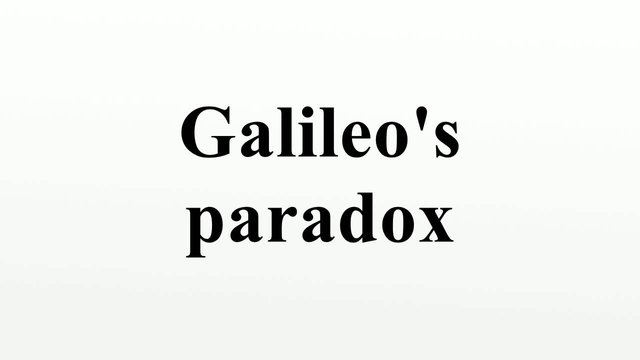Galileo's paradox

In general terms, a paradox is a result that seems to be true even though it contradicts our principles. Therefore, paradoxes have an important component of mental challenge, as they force us to question our beliefs. Scientific thought, throughout its history, has faced various paradoxes, which have made us rectify and evolve, that is, learn.
It was the year 1636 when Galileo Galilei, imprisoned for life in his house in Florence because of his well-known Copernican ideas, published his last book just before losing his sight: "Discourses on two new sciences." These sciences to which it refers and that pretends to postulate are the mechanics and the resistance of the materials, that without good but not complete sciences, today are fundamental fields of the modern Physics. In this work, Galileo makes some assertions about the infinite set of natural numbers that are indeed paradoxical. We can summarize them in the following two statements:
- There are natural numbers that are perfect squares and others that are not, so the perfect squares are a subset, a part of the set of natural numbers.
- For each perfect square there is exactly one number that is its square root, and for each number there is exactly another one that is its square, so there can be no more than one type than another.
The paradox is that these two statements, which then and now can be convinced that they are absolutely true, question the basic principle of Set Theory that the whole is greater than its parts, because in this case there is a part Of perfect squares) that would be equal to the whole (natural numbers) even though it seems impossible to have elements in the whole that are not in the part (the perfect non-squares).
What did Galileo learn from this? He came to the conclusion that order relations (minor, major and equal) only make sense to finite sets.
It is true that at the time of Galileo, the Theory of Sets was not yet developed, and the paradox rather called into question the "intuition" of men of science. In the 19th century, the great Georg Cantor developed the foundations of the Set Theory that we know today, using in part the ideas of Galileo. What did Cantor learn of Galileo's paradox? He discovered that Galileo's claims were valid for the set of whole numbers and for rational ones. The paradox led him to investigate the properties of infinite sets (no doubt no one has studied them like him) and came to the conclusion that some infinite sets were greater than others.
The paradox of Galileo, a simple observation that contributed its grain of sand to the impetus of research and progress in science. Such are the paradoxes.
More details here: paradox of Galileo

Yes, a number of other mathematicians looked at the same paradox... and fled. The idea that something as simple as one-to-one correspondence could help solve the 'sizes of infinity' is amusing.
Yes, that's right, friend :)
This post is extremely well written! Thanks for sharing this.
After reading your post, I cannot prevent myself from thinking about series inequalities used in math demonstrations I learned when I was young.
Thank you :)
Interesting this paradox